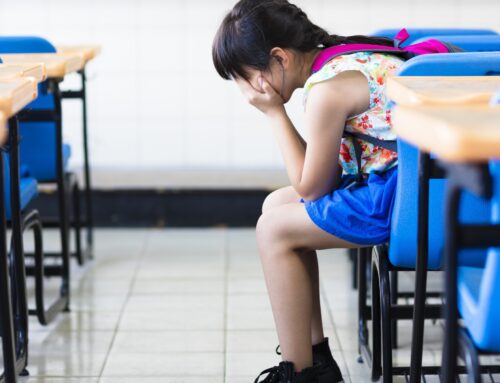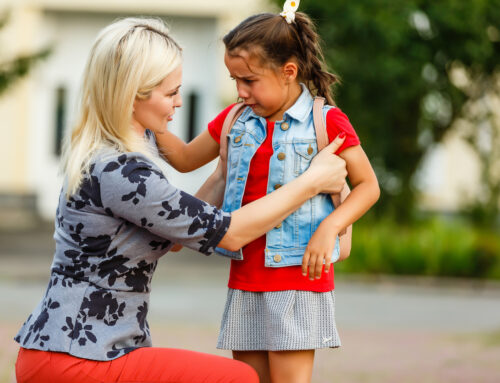
“Why didn’t someone see what was about to happen?”
As Albert Mohler presents in his podcast, The Briefing, this is something we often wonder when tragedy strikes—like the school shooting that took place in Oxford, Michigan.
On November 30, 2021, 15-year-old Ethan Crumbley allegedly shot 10 students and a teacher in his school, killing four of the students.
What makes this case even more disturbing, as Mohler points out, is that there seems to be many people who did see that this was about to happen. The events leading up to the shooting stack up into convincing evidence that Ethan wanted to inflict harm.
Perhaps the most incriminating moment was when a teacher found an alarming drawing on Ethan’s desk the day of the shooting. The drawing depicted bullets and a person who was shot along with words like “The thoughts won’t stop. Help me” and “The world is dead.” The teacher reported the incident, and Ethan was sent to the principal’s office with his backpack.
His parents took an hour and a half to arrive and denied a request to take Ethan home. When they saw Ethan’s drawing, they failed to mention that they had purchased a gun that previous Friday. They never asked Ethan if he had brought the gun to school with him. Without this knowledge, school counselors believed that Ethan did not pose a threat due to his demeanor, his answers to their questions, and his lack of prior disciplinary problems.
So, he was sent back to class. Not long after, he started shooting.
Ethan’s parents potentially had reason to believe he had possession of the gun. The day before the shooting, November 29, the school caught Ethan searching for ammunition online. Although his mother didn’t answer the school’s calls or emails, she did send Ethan a text saying, “Lol. I’m not mad at you. You have to learn not to get caught.”
In a recent episode of The Briefing, Mohler brings up questions we’re all wondering. For instance, if Ethan’s parents knew what their son was struggling with, why would they have allowed him to have access to a gun? Why did they give him one that could fit into his backpack? Why did his mom seem to cheer him on when he got in trouble at school?
And why didn’t they mention the gun when they were called in by the school?
All these unanswered questions are perhaps why Ethan’s parents are being charged with involuntary manslaughter.
In the wake of tragedies like this, pro-Second Amendment and gun control experts alike come forward to give their opinion on what should have happened and what needs to happen in the future. Yes, it was legal for Ethan’s father to purchase the pistol in Michigan. It wasn’t legal for Ethan, a minor, to possess that gun outside of certain situations like hunting with an adult.
But gun rights aside, there’s a larger issue at stake. Yes, Ethan used a gun to inflict harm upon others, but gun or no gun, this boy was struggling. I believe he would have found a way to carry out his violent urges, with or without a gun.
Ethan’s actions illustrate a blatant disregard for the law, not just in his own family, but in society as a whole.
Mohler makes the interesting claim that “the public schools are just emblematic of the larger society. Only ironically, as it might be said only more so.”
How is that?
As Mohler says, society has failed to “[make] decisions that might be unpopular—but are clearly right—indeed, clearly necessary.” And that’s because schools have lost the authority to implement any discipline.
For example, I know a teacher in New Jersey whose school prohibits her from using negative words to talk about students. While teachers certainly shouldn’t be disrespectful to students, what about situations when a student is being dishonest, unkind—or even showing behavior like Ethan Crumbley? Isn’t the whole reason for using “negative” words to correct the behavior so it doesn’t happen again?
And it’s much worse in other areas. Mohler brings up one school in Kentucky where there were 6,700 fights in the first 71 days of the academic year. The union president of the school sums it up like this: “Right now, these kids know they’re untouchable and until there are consequences for their actions, they’re not stupid. They know what they can get away with. They know there’s no punishment other than maybe a one-day suspension or something like that.”
Of course. Without discipline, why wouldn’t students do whatever they want?
But here’s the truth.
Discipline, while oftentimes unglamorous, is for the benefit of the child. It’s to avoid problems down the road, so something terrible doesn’t happen.
As Mohler says, what makes this situation in Michigan and in these other schools even sadder is that it’s mirrored outside of the schools. In many places across the country, especially urban areas, crime has skyrocketed. People aren’t being held accountable for their actions.
It’s important then for parents to consider not just the curriculum that’s taught in school, but the moral culture. What disciplinary actions are in place—if any at all? Ask the tough questions. Hold your school accountable. After all, the future of our society depends on how kids are molded in school.
And we don’t want another situation where someone sees what is about to happen, but fails to take action.
The bottom line is this: we need discipline to function as a society. As Mohler concludes, “If there is a breakdown in discipline, nothing else will really matter.”





[…] Read more about why school discipline is in a free fall. […]
[…] if you’re worried about your student’s mental health, focus on learning, positivity, and firm, loving discipline in your classroom, rather than trying to do the work of a therapist. Know the warning signs of a child or teen who […]
[…] Read more about why school discipline is in a free fall. […]